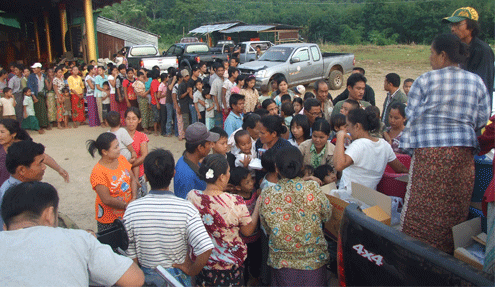Rai Maraoh, Independent Mon News Agency - Throughout the new USDP government’s military campaign against ethnic nationalities of Kachin and Shan State, those victims who have suffered the most are the ethnic civilians, explain Mon politicians.
 “Let’s say, that when the fighting happens, the military commanders and soldiers are holding arms and they can protect themselves. But, thousands of innocent civilians are facing troubles and suffering,” said Nai Hong Sar, the General Secretary of the United Nationalities Federal Council (UNFC) during his telephone interview with IMNA.
“Let’s say, that when the fighting happens, the military commanders and soldiers are holding arms and they can protect themselves. But, thousands of innocent civilians are facing troubles and suffering,” said Nai Hong Sar, the General Secretary of the United Nationalities Federal Council (UNFC) during his telephone interview with IMNA.
Since gaining political power and forming the new Burmese government led by a majority of USDP candidates, the Burmese Army (tatmadaw) has launched serial military offensives against both former ethnic ceasefire groups like the Shan State Progressive Party, Kachin Independent Organization, and Democratic Karen Buddhist Organization and non-ceasefire groups like the Karen National Union continuously.
“During the current situation, thousands of refugees and displaced persons have to flee from their homes because of fighting in Kachin State. Why do they have to flee? They face killing, torture and rape by the Burmese Army troops. They face food-shortage problems after restrictions. They all face various troubles and problems,” added Nai Hong Sar.
Accordingly to a Kachin news source, Kachin News Group (KNG), over 10,000 Kachin refugees have fled from their homes and taken shelter on the Chinese border.
Members of the All Mon Regions Democracy Party, which participated in the 2010 elections, also stated dismay about the military campaign in the ethnic regions.
“Our party and other brotherhood ethnic parties have officially announced that our demands are for ‘peace’, and we asked the government to build peace. We are very unhappy about this war. It is certain that the people will suffer the most,” said Nai Ngwe Thein, the AMDP Chairperson.
Nai Ngwe Thein added that the current military campaign in Kachin, Shan and Karen States may also move down into Mon State. Both Mon leaders, Nai Hong Sar and Nai Ngwe Thein, believe that after the Burmese Army troops fight against the larger ethnic armed groups, they may select medium ethnic armed groups and then small armed groups as their next targets.
The UNFC, an alliance of ethnic armed groups, has also demanded assistance from the international community to provide help for those refugees fleeing from war in the ethnic regions of Burma.
The conflict between the central government and ethnic armed groups began on November 7, 2010, the day of nationwide Burmese elections. The ethnic armed ceasefire groups denied the recent government’s proposal to transform their armed forces into the Burmese government-run Border Guard Force. The government also denied the ethnic armed oppositions’ demand to review and revise Burma’s 2008 constitution.
The current Burmese government was formed in March 2011, and is ruled based on the 2008 constitution, which mandates that 25% of the Burmese political positions be filled by the Burmese army in both the national and state level parliaments.



